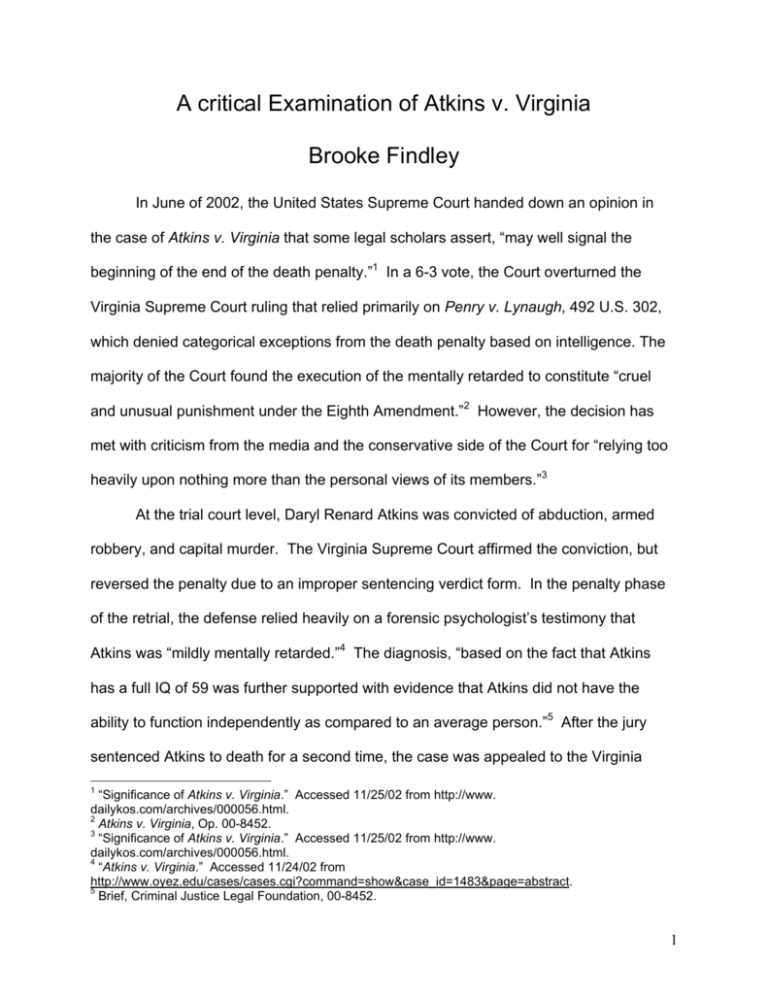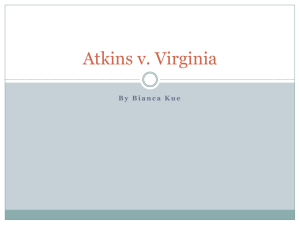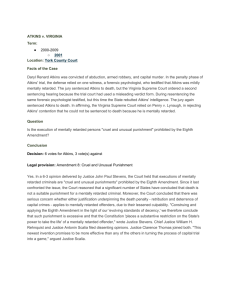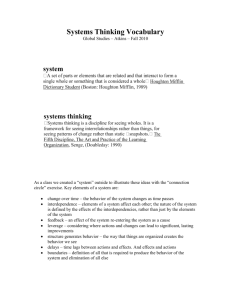A critical Examination of Atkins v. Virginia Brooke Findley
advertisement

A critical Examination of Atkins v. Virginia Brooke Findley In June of 2002, the United States Supreme Court handed down an opinion in the case of Atkins v. Virginia that some legal scholars assert, “may well signal the beginning of the end of the death penalty.”1 In a 6-3 vote, the Court overturned the Virginia Supreme Court ruling that relied primarily on Penry v. Lynaugh, 492 U.S. 302, which denied categorical exceptions from the death penalty based on intelligence. The majority of the Court found the execution of the mentally retarded to constitute “cruel and unusual punishment under the Eighth Amendment.”2 However, the decision has met with criticism from the media and the conservative side of the Court for “relying too heavily upon nothing more than the personal views of its members.”3 At the trial court level, Daryl Renard Atkins was convicted of abduction, armed robbery, and capital murder. The Virginia Supreme Court affirmed the conviction, but reversed the penalty due to an improper sentencing verdict form. In the penalty phase of the retrial, the defense relied heavily on a forensic psychologist’s testimony that Atkins was “mildly mentally retarded.”4 The diagnosis, “based on the fact that Atkins has a full IQ of 59 was further supported with evidence that Atkins did not have the ability to function independently as compared to an average person.”5 After the jury sentenced Atkins to death for a second time, the case was appealed to the Virginia 1 “Significance of Atkins v. Virginia.” Accessed 11/25/02 from http://www. dailykos.com/archives/000056.html. 2 Atkins v. Virginia, Op. 00-8452. 3 “Significance of Atkins v. Virginia.” Accessed 11/25/02 from http://www. dailykos.com/archives/000056.html. 4 “Atkins v. Virginia.” Accessed 11/24/02 from http://www.oyez.edu/cases/cases.cgi?command=show&case_id=1483&page=abstract. 5 Brief, Criminal Justice Legal Foundation, 00-8452. 1 Supreme Court, where the lower court’s decision was upheld based on Penry v. Lynaugh. In Penry, the Court declined to create an exemption of the mentally retarded from the death penalty, citing that the Eighth Amendment does not categorically prohibit the execution of mentally retarded capital murderers based upon reasoning ability. 6 Justice O’Connor, who authored the opinion, argued that the Eighth Amendment's categorical prohibition for cruel and unusual punishment does apply to practices condemned by the common law at the time the Bill of Rights was adopted. The Court included in the definition: “punishments which offend our society's evolving standards of decency as expressed in objective evidence of legislative enactments and the conduct of sentencing juries.” 7 Although law in the time of the framers did forbid the punishment of "idiots" describing “persons totally lacking in reason, understanding, or the ability to distinguish between good and evil,”8 the Court argued that the punishment of these people is unlikely in today’s society because "mental defect" is part of the current legal definition of insanity, and therefore not needed to be addressed separately.9 Atkins appealed the Virginia Supreme Court’s decision to the United States Supreme Court, which unanimously granted a writ of certiorari limited to the following question: “Whether the execution of mentally retarded individuals convicted of capital crimes violates the Eighth Amendment?"10 During this time, amicus curiae briefs were submitted by the Criminal Justice Legal Foundation (CJLF) in support of the 6 PENRY v. LYNAUGH, 492 U.S. 302 (1989) Ibid 8 Ibid 9 Ibid 10 Atkins v. Virginia, Op. 00-8452. 7 2 respondent, the Commonwealth of Virginia,11 and by amicus curiae petitioners involved in McCarver v. North Carolina, in support of the petitioner, Daryl Atkins. The CJLF encouraged the Court to follow the precedent set in Penry, citing that the analysis used in deciding that case “still holds” today.12 The CJLF acknowledged that more states had outlawed the practice of the mentally retarded, but claimed that the consensus had not yet reached constitutional proportions and therefore did not fall under “evolving standards of decency.”13 The CJLF further cautioned that accepting the defendant’s claim would disrupt state capital punishment systems through retrials and successive habeas petitions for death row inmates claiming mental retardation. Amicus curiae briefs were not originally filed on behalf of the petitioner, however briefs submitted in McCarver v. North Carolina were later granted consideration in support of the petitioner after North Carolina outlawed the execution of mentally retarded prisoners, and Atkins replaced McCarver on the Supreme Court docket. In McCarver, a prisoner, Ernest P. McCarver of North Carolina, possessing an IQ of 67, faced the same punishment as Atkins. Numerous interest groups, including the American Civil Liberties Union, filed amicus curiae briefs that centered their arguments around the inability of prisoners with diminished mentality to navigate the court system effectively. The briefs also argued that mentally retarded prisoners are very often denied relief in the form of federal habeas corpus.14 The briefs also reminded the Court that Congress was on their side; when Congress in 1988 reinstated the federal death penalty, it provided that a “sentence of death shall not be carried out upon a person who 11 Brief, Criminal Justice Legal Foundation, 00-8452. Ibid 13 Ibid 14 Brief, American Civil Liberties Union, et al., 00-8727. 12 3 is mentally retarded.”15 Public opinion polls, often referred to in the amicus curiae briefs, echoed these sentiments. A variety of religious, social and international organizations signed onto the briefs at that time. The Supreme Court moved onto the next stage, hearing oral arguments on February 20, 2002, and announced the decision on June 20, 2002. The Court, in a 6-3 vote held the assertion that “executions of mentally retarded criminals are ‘cruel and unusual punishment’ prohibited by the eighth amendment.”16 Justice Stevens delivered the opinion, joined by Justices O’Connor, Kennedy, Souter, Ginsburg, and Breyer. In the opinion, the court reasoned that in the time since Penry, a large number of states had concluded that death is not a suitable punishment for a mentally retarded criminal.17 Also, the court reasoned that the main motive for capital punishment, deterrence through culpability, did not apply to mentally retarded offenders.18 The Court also found that the element of mental retardation also influenced the possibility that a person would “confess to a crime they did not commit,” lessen their “ability to give their counsel meaningful assistance,” and may unwittingly appear to have “a lack of remorse for their crimes.”19 Finally, the Court found that regarding the “evolving standards of decency” in which they employ in their logic, the Eighth Amendment would support that the Constitution “places a substantive restriction on the state’s power to take the life” of a mentally retarded offender.20 The Court cited many examples of the changing opinions of society that captured the need for the change in judgment, including many public 15 “Atkins v. Virginia.” Accessed 11/24/02 from http://www.oyez.edu/cases/cases.cgi?command=show&case_id=1483&page=abstract. 16 Atkins v. Virginia, Op. 00-8452. 17 “Atkins v. Virginia.” Accessed 11/24/02 from http://www.oyez.edu/cases/cases.cgi?command=show&case_id=1483&page=abstract. 18 Atkins v. Virginia, Op. 00-8452 19 Ibid 20 Ibid 4 opinion polls and literature found in and referred to in the amicus curiae briefs considered through McCarver v. North Carolina. Two Justices, Rehnquist and Scalia wrote dissenting opinions, which Justice Thomas also signed. Rehnquist’s dissent cited the legislative judgment of the majority as “a rationalization for the majority’s subjectively preferred result rather than any objective effort to ascertain the content of an evolving standard of decency.”21 He finds shortcomings in the majority’s opinion by asserting that the Court’s decision to place authority on foreign laws, the views of professional and religious organizations and public opinion polls in reaching its conclusion to be defective. Justice Rehnquist concluded his argument by accusing the Court of going beyond the well-established indicators of contemporary values, and questioned the validity of the opinion polls cited in the Court’s decision, claiming that they are nothing more that “private organizations speaking only for themselves.”22 Scalia, in his dissent, echoed Rehnquist’s concerns about the theoretically marginal information that the Court used in making its decision. He further asserted that he found “no support in the text or history of the Eighth Amendment” for the Court’s opinion. He claims that at the time of the founders, “only those known as idiots, whom were severely and profoundly retarded, enjoyed any special status from the law.”23 Scalia claims that persons with the mental capacity of Atkins are not deficient enough to be included in that classification. He further argues in his dissent that the legislation that the Court feels is indicative of the opinions of society is still too immature to be 21 Atkins v. Virginia, Diss. 00-8452 (Rehnquist.) Ibid 23 Atkins v. Virginia, Diss. 00-8452 (Scalia.) 22 5 given that much authority.24 Finally, Scalia charges that the opinion polls used by the Court were not just poor choices, but totally irrelevant to the decision. Prominent experts, such as Notre Dame Law School professor Richard W. Garnett, are not surprised by the outcome of this case. He, like many others, applauds it as a step in the right direction for the contemporary court, but cautions that the decision does not rest much logic on the language of the Constitution.25 Many courtwatchers, such as writers for the Daily Kos, suggest that the decision not only effects the mentally retarded, but also may be an indication of the changing view of the Court.26 In Penry, Justice O’Connor not only supported the death penalty for the mentally retarded, but also wrote the opinion. By 2002, in Atkins, she had switched camps, siding with the liberal side of the Court. Some see this as a possible move toward future annihilation of capital punishment, which has conservatives concerned. Many critics are anxiously waiting to see how the court reacts in pending capital punishment cases. Since the decision has been handed down, little has changed in the eyes of the American public or the institutions that govern society. The decision is still new, and the administration has yet to put forth any substantial policies relating to the issue. However, at the state level, the country’s policy on executing the mentally retarded was already headed in the direction that Atkins supplies. Eighteen states have already outlawed the execution of mentally retarded prisoners, and at least twice that number 24 Ibid “Personal Problems.” Accessed 11/28/02 from http://www.nationalreview.com/comment/commentgarnett062002.asp. 26 “Significance of Atkins v. Virginia.” Accessed 11/25/02 from http://www. dailykos.com/archives/000056.html. 25 6 has passed similar legislation in one house. The Supreme Court’s ruling in Atkins v. Virginia seems likely to encourage more state legislatures to restrict the execution of the mentally deficient. 7











